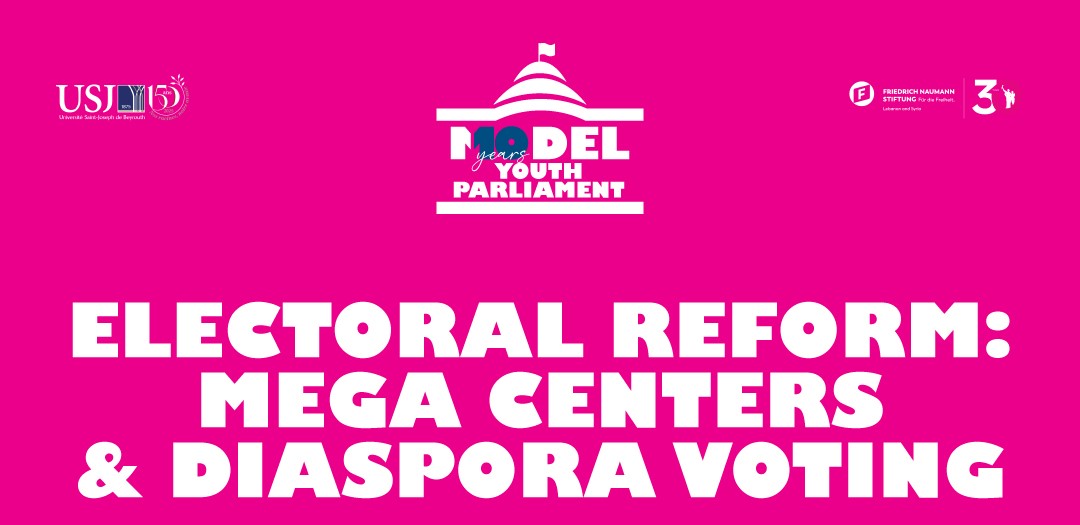Model Youth Parliament
Bringing the Vote Closer

Written by MYP10 mentors Nour Daccache & Toni Jreich
Free and fair elections are the cornerstone of any democracy, but in Lebanon, access to that cornerstone is still limited by outdated laws and structural barriers. As the 10th edition of the Model Youth Parliament (MYP) engages with pressing legislative reforms, one draft law stands out for its potential to make elections more inclusive and representative: a proposal to establish mega voting centers and secure real electoral participation for Lebanese citizens abroad.
In a time when many Lebanese are losing faith in the political system, these two changes are more than technical adjustments. They represent a pathway to restoring public trust, modernizing the electoral process, and making democratic participation accessible to all citizens regardless of geography.
The Problem: Voter Disenfranchisement at Home and Abroad
Under the current electoral framework, Lebanese voters are required to cast their ballots in their ancestral hometowns, regardless of where they actually reside. This rule disproportionately burdens citizens living in cities or far from their registered village. For many working-class voters, especially in the current economic crisis, traveling long distances to vote is simply not possible. This outdated system deters participation, particularly among youth and women, groups already underrepresented in political life.
Meanwhile, the Lebanese diaspora, estimated in the millions, is largely excluded from meaningful political engagement. While existing law technically allocates six parliamentary seats for expatriates, these are divided by religious affiliation and limited in scope. Instead of granting expats full voting rights, this symbolic representation weakens their voice and disconnects them from shaping Lebanon’s political future.
Research from the Lebanese Association for Democratic Elections (LADE) confirms that both obstacles, domestic and abroad, contribute to declining voter turnout and diminished faith in democratic institutions.
What the Draft Law Proposes
This draft law introduces two foundational reforms:
- Creation of Mega Centers: Voters would be able to cast their ballots at centralized, easily accessible polling stations in their area of residence, rather than traveling to their place of registration. This change would simplify the voting process, particularly for urban residents and those without private transportation.
- Full Electoral Rights for Expats: Instead of limiting Lebanese abroad to voting for six seats reserved by sect, the law would grant them the right to vote for all 128 members of parliament, just like citizens residing in Lebanon. This affirms the principle of equal citizenship and strengthens the bond between Lebanon and its diaspora.
Why It Matters
Passing this law would mark a major step toward electoral equity in Lebanon. It would empower youth, women, and working-class citizens by removing logistical barriers to participation. It would also make diaspora voices count — not in symbolic terms, but in shaping the full composition of parliament.
Crucially, by allowing people to vote closer to where they live, the reform could reduce the influence of traditional patronage networks and sectarian clientelism that often manipulate voters in their villages. It brings the ballot box closer to daily life, and further from political coercion.
However, if the reform is postponed or dismissed, the consequences are clear: continued low turnout, growing frustration, and further erosion of trust in democratic institutions. Future generations may increasingly feel that their vote does not matter, and that is a democratic loss Lebanon cannot afford.
Supporting this draft law during MYP10 is not just about improving electoral logistics. It is about reclaiming democracy for all Lebanese, wherever they live. This is an opportunity to affirm the values of fairness, equality, and participation, and to bring the vote closer to the people.